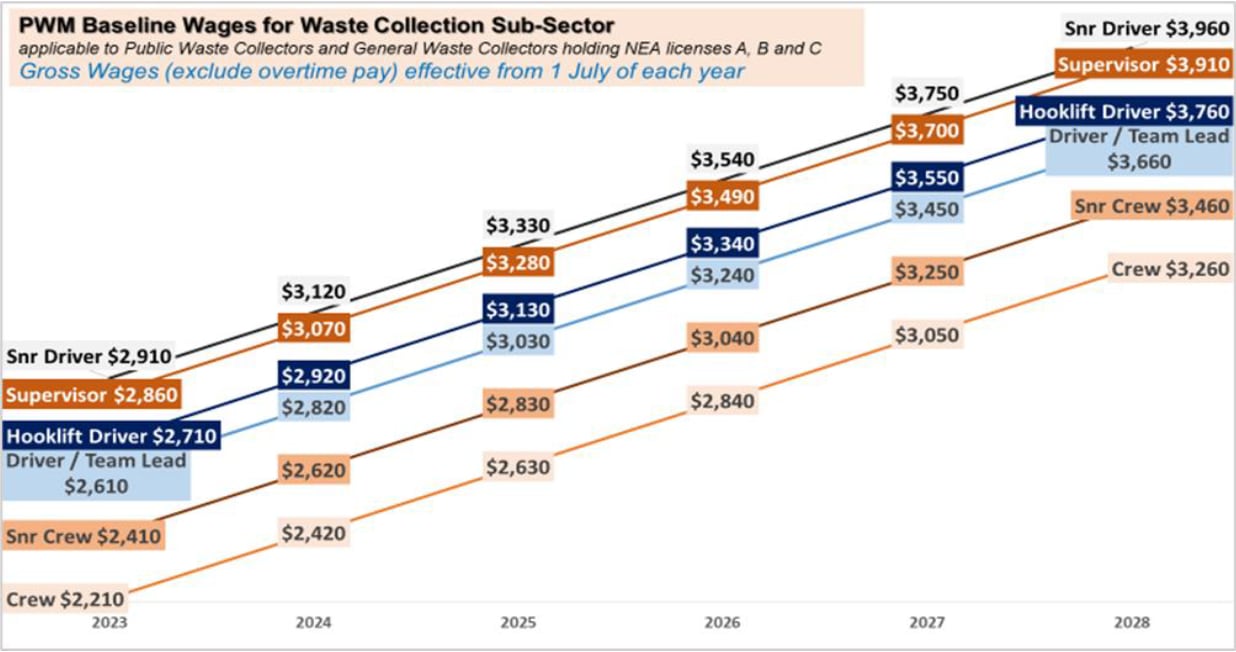Gross salary for entry-level waste collection workers to rise to S$3,260 a month by 2028
SINGAPORE: The monthly gross salary for entry-level waste collection workers who are Singaporeans or permanent residents is set to rise to S$3,260 by 2028, under a new progressive wage model for the sector.
This comes after the Government accepted recommendations by the Tripartite Cluster for Waste Management (TCWM) for a progressive wage model for the waste management industry, said the Ministry of Manpower (MOM) and the National Environment Agency (NEA) on Monday (Jan 24).
According to the National Trades Union Congress, the total monthly gross wage refers to the sum of the monthly basic wage, overtime payments, commissions, allowances and other cash payments, and is before deduction of employee CPF.
The recommendations cover the waste collection and materials recovery sub-sectors, and also includes items such as a mandatory annual bonus as well as career and skills ladder progression.
Up to 3,000 Singaporean and permanent resident workers in the waste management sector are set to benefit from the new progressive wage model, said MOM and NEA.
MONTHLY SALARIES
Under the model, the gross wages for entry-level waste collection workers who are Singaporeans or permanent residents are set to increase from S$2,210 in July 2023. Subsequently, the amount will increase by S$210 each year until 2028 when it hits S$3,260.
This translates into a 48 per cent increase over the six-year period.
The baseline wages for senior drivers in the waste collection sector are expected to increase from S$2,910 in 2023 to S$3,960 by 2028.
This will "ensure our lower-wage workers have meaningful and sustained wage growth to gain ground with the median worker", said MOM and NEA.
In the materials recovery sub-sector, entry-level jobs such as sorters can expect to see their pay increase from S$2,110 in 2023 to S$3,160 by 2028.

MANDATORY ANNUAL BONUS
The progressive wage model also stipulates a mandatory annual bonus for eligible waste management workers who are Singaporeans and permanent residents.
Taking effect in January 2024, workers should receive at least one month's pay as annual bonus if they have been with their employers for at least one year. This bonus is not tied to their work performance.
"This will enable employers to better attract and retain waste management workers, and complement their efforts to invest in their workers’ training to enhance productivity," said MOM and NEA.
CAREER PROGRESSION
The progressive wage model also provides clear career progression pathways for various job roles in operational and supervisory positions within the waste collection and materials recovery sub-sectors.
There are also training requirements, which include requiring at least two Workforce Skills Qualification (WSQ) modules for entry-level works and additional WSQ modules for higher-level job roles.
Waste management firms are recommended to ensure that their workers attain the training requirements by Jul 1, 2023.

"Waste management workers provide essential services that keep Singapore clean. It is vital that we continue to support the waste management industry in creating a more skilled and productive workforce, with more attractive careers for its workers," said MOM and NEA.
Mr Fahmi Aliman, chairman of the TCWM, urged society to recognise and value the importance of the waste management workforce, especially amidst challenges in the COVID-19 pandemic.
"Waste management is a critical and essential service. Our waste management workers put in very hard work to keep our environment clean, and the work that they do is undoubtedly very tough," said Mr Fahmi.
"Indeed, they deserve due recognition."
Editor's note: The article has been amended to reflect that the baseline wages for waste collection workers is stipulated in gross terms.















